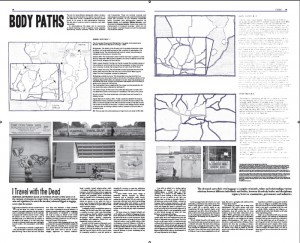Sudirman Adi Makmur spends an inordinate amount of time alone or in the company of strangers no longer living. It’s a waiting game, with myriad rules and regulations, in which the deceased, otherwise tagged as baggage, is not often the winner.
Would you believe it if I told you that I travel with the dead? No, really, it’s actually a business. I am with a firm that is in this business and it is sometimes necessary to have somebody accompany the casket in transit: by law – being the statute of the country that the casket is travelling from, or its destination; by request, at the behest of the family or of some other party or body; or because of the body, who it belonged to, how it died – the circumstances of the death itself.
You would think it would be a simple matter, that the deceased would have fewer demands than the living. This is never the case. The dead have their own demands: a death certificate and a letter of permission from the Ministry of Health to transport the body; a letter confirming the authorisation of whomever is collecting the body as acting on behalf of the closest living relative; a letter from the Foreign Affairs Ministry providing permission for the body to enter the country of destination.
There are also rules regulating the body. The dead must be: (a) properly embalmed and placed in the casket; (b) cremated; or (c) accompanied by a permit issued by the funeral director. The casket itself comes with its own set of laws: airtight, impervious to external influence. Some countries require metal-to-metal solder – everything hermetically sealed and ready for transport – to prevent re-entry of micro-organisms or other forms of contamination. In reality, all materials are permeable, hence specifications define acceptable levels of hermeticity and these too differ from country to country. Borders are always too porous or too open, too easy to cross or too resistant, closed off or impossible to escape. What is sealed in one place may be wide open in another context.
Sometimes all these arrangements amount to nothing. The deceased carry their own baggage: a complex of morals, values and relationships; various relations between different individuals and bodies, between disorderly bodies and disciplinary regimes, between communities, governments and industries. Global lives are fragmented, souls are split open.
In some cases, the country of departure won’t release the body. Or entry is refused. There are delays in identifying bodies and conducting autopsies. The body is a threat; it can testify – the skin, the hair, the blood, all tell a story. It must be contained, isolated to avoid the spread of insurgencies, incursion or intrusion, infiltration and infestation of other bodies or the larger body politic.
I spend endless hours alone, sitting in embassies, airports, morgues, on metros, escalators and in Starbucks coffee houses, waiting for the go-ahead. The call comes and 14 hours and a few time zones later I am barrelling through barren desert. The weather is stained brown. The morgue in Zeinhom, Cairo stands apart, on the outskirts, cool blue basement dust drifting streaks on the walls, the grey smell of institution spaces.
The body is that of a Sudanese refugee, one of 30 killed, it is alleged, by Egyptian security forces. Why does not concern me. The less I know the better. My focus is on the paperwork. All the necessary documents are in my possession: death certificate (with no cause of death listed); a letter of permission from the Ministry of Health to transport the body to Sudan and; a letter from the Foreign Affairs Ministry sent from Khartoum via the Sudanese Embassy in Cairo; a document from the Ministry of Justice confirming my authorisation.
I am here on behalf of a foreign agency representing the families of the deceased: AMERA-Egypt, a refugee legal aid NGO operating as a branch of the AMERA UK Charity. I know nothing of their work. Their motives are not of interest to me. They pay upfront, that is all that is required. Money is the lubricant in this world. Death is always an economy. Value is always expressed as cost: the value of a life as displayed in the mourning of its death; the lengths the family is prepared to go to; the will of the deceased and the willpower of their nearest relatives; and arrangements made on their behalf, through the estate, the trust executor or through other means.
The situation is complex. Events are always double-sided, above and underground. Life and death are separated across this y-axis. For every barrier on the surface there is a subterranean fix or detour. Every step you have to cough up money and pay bribes. I have already met and paid off representatives from both the Sudanese Embassy and the Egyptian government. I have booked the flight and greased the palms of representatives of the cargo department at Air Egypt.
In the morning I enlist the services of a local undertaker, a small man, who ushers me in. The room is clean, spartan – with only a washbasin and a table. He is discreet, suited to my requirements. He nods, expresses regrets at the circumstances and steers clear of the politics. He sticks to the task at hand, preparation techniques as per international regulations, the transport requirements. ‘Everything will be prepared,’ he assures me.
We are already enroute to the airport – in a black and nondescript van as per my specifications – when the call comes. The driver slows when my phones rings as though he anticipated it. ‘Yes,’ I say, hearing the detachment in my voice. The call comes from a three-star police officer based in Zeinhom. I am to return immediately with the body. His tone is apologetic; the order has been received ‘from above’.
The details are unique, but in many ways representative: The orders always come from above, from some higher authority – the police, government, from the powers that be, from tradition, from God, Allah. Often these are in conflict. Where government and tradition fail, religion might offer some respite, an alternative rite that provides a soft landing for the family against self-recrimination. The body will be housed in a vault and buried in Zeinhom, before sundown the next day according to Islamic custom. I am to make the arrangements, pay the funeral costs, enlist an Imam to lead the prayers and confirm these details to the morgue authorities.
I myself do not believe in any god. It is better that way, no religion to interfere with making decisions on how best to execute preparations for burial or for travel – according to the law and/or specific beliefs, traditions and religions, as specified by the will of the deceased or the next of kin representing them.
I dress in a clean black linen suit, my shirt is white, pressed – the uniform of international business. I take my seat near the rear of the plane, an isle seat rather than one at the window – I have long tired of the view from above. I prefer the international movie channel, select ‘Action’ and order a single glass of wine with my dinner. I am just another passenger; there is no way to know my profession, to know that I do not travel alone.
This article features alongside maps charting movements of bodies after death, Body Paths, in the April 2013 print issue of The Chronic – get copy from your nearest dealer, or buy it online.
[button link=”http://www.chimurenga.co.za/chimurenga-shop” color=”red”]Buy the Chronic[/button]


